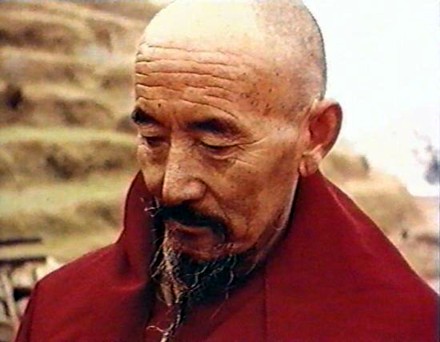Khenpo Sangye Tendzin: Difference between revisions
Jump to navigation
Jump to search
No edit summary |
No edit summary |
||
| Line 1: | Line 1: | ||
[[Image:Khenpo Sangye Tendzin.jpg|frame|'''Khenpo Sangye Tendzin''']] | [[Image:Khenpo Sangye Tendzin.jpg|frame|'''Khenpo Sangye Tendzin''']] | ||
'''Khenpo Sangye Tendzin''' (1904-?) - A [[Sakya]] [[khenpo]] who lived at [[Guru Sakya Monastery]] in Ghoom, near Darjeeling, and was famous for his writings on the works of [[Sakya Pandita]], especially his commentary on the ''[[Sakya Lekshé]]'', which he wrote in 1972. He gave the transmission of [[Kamalashila]]'s ''[[Stages of Meditation]]'' to [[His Holiness the Dalai Lama]]. | '''Khenpo Sangye Tendzin''' (1904-?) - A [[Sakya]] [[khenpo]] who lived at [[Guru Sakya Monastery]] in Ghoom, near Darjeeling, and was famous for his writings on the works of [[Sakya Pandita]], especially his commentary on the ''[[Sakya Lekshé]]'', which he wrote in 1972. He gave the transmission of [[Kamalashila]]'s ''[[Stages of Meditation]]'' to [[His Holiness the Dalai Lama]]. | ||
==His Writings== | |||
His commentary on Sapan's ''[[Sakya Lekshé]]'' has been translated into English. He also wrote a commentary to Sapan's ''[[Clear Differentiation of the Three Sets of Vows]]'' and to [[Gorampa]]'s ''sdom gsum kha skong''. | |||
==Further Reading== | ==Further Reading== | ||
Revision as of 07:09, 28 July 2008

Khenpo Sangye Tendzin (1904-?) - A Sakya khenpo who lived at Guru Sakya Monastery in Ghoom, near Darjeeling, and was famous for his writings on the works of Sakya Pandita, especially his commentary on the Sakya Lekshé, which he wrote in 1972. He gave the transmission of Kamalashila's Stages of Meditation to His Holiness the Dalai Lama.
His Writings
His commentary on Sapan's Sakya Lekshé has been translated into English. He also wrote a commentary to Sapan's Clear Differentiation of the Three Sets of Vows and to Gorampa's sdom gsum kha skong.
Further Reading
- Sakya Pandita, Ordinary Wisdom: Sakya Pandita's Treasury of Good Advice, translated by John T. Davenport, Boston: Wisdom, 2000